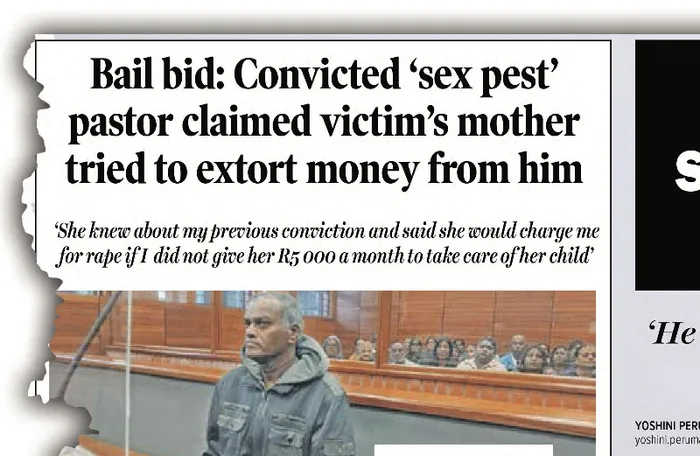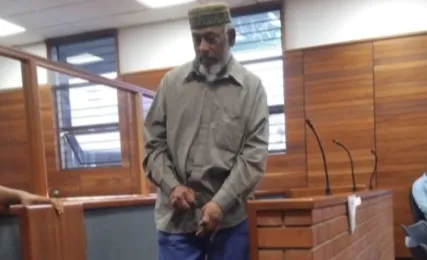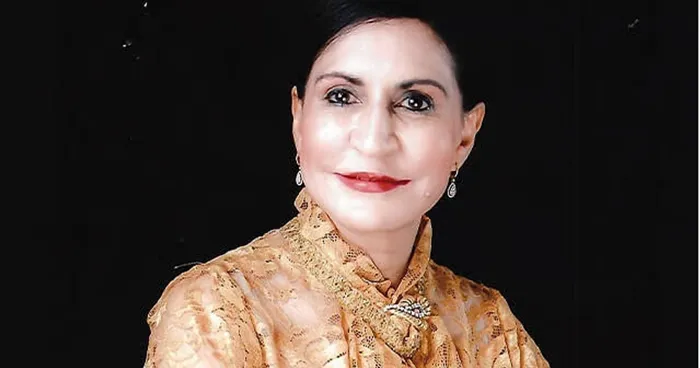Children can’t wait: South Africa’s delay on the sex offender register is a betrayal
An unfulfilled promise for child protection

Sitham Baram Michael Andrew Chetty, a Chatsworth pastor, was charged with the rape of a 12-year-old boy from his congregation. The 54-year-old had previously received a three year suspended sentence after he was convicted of sexually assaulting another minor in May 2019.
Image: File
WHY do some convicted child sex offenders reoffend? And why, in 2025, is South Africa still failing to make its National Register for Sex Offenders publicly accessible?
These are not just bureaucratic questions; they cut to the core of how seriously we, as a society, value the safety and dignity of our children. For survivors and those who work in child protection, these questions are not academic. They are urgent, painful and personal. Every delay, every policy failure, every unmonitored offender represents the possibility of another child’s life being shattered.
The reality of repeat offending
Research has long shown that prior conviction for a sexual offence is one of the strongest indicators of future risk. In one Canadian study, offenders with no prior record had a 19% reconviction rate over 15 years, compared with nearly 37% among those previously convicted.
In Australia, a comprehensive review found that about 15% of child sexual offenders were reconvicted, most within two to four years after release. But the risk never disappears. Some long-term studies found reoffending even 15 to 20 years later. These numbers may sound small, but each percentage point represents real children, each with lifelong consequences.
It only takes one offender, in one school or youth centre, to devastate dozens of lives. Many perpetrators who reoffend share similar patterns: deeply entrenched deviant sexual interests, distorted beliefs (“the child wanted it”), poor impulse control, and an inability to form healthy adult relationships.
Some have histories of childhood trauma themselves, though this does not excuse their actions. Treatment can reduce risk, but only if it is targeted and sustained. Too often, rehabilitation programmes are generic, short-term, or poorly resourced. Without continuous monitoring and treatment of high-risk individuals, the cycle of harm continues.

Abdool Kader Yusuf, a 66-year-old convicted child sex offender from Chatsworth, currently on parole for a previous rape conviction, recently appeared in court on charges of raping a 10-year-old girl.
Image: Yoshini Perumal
Systemic failures enable repeat abuse
Repeat offending is not only the result of personal pathology. It also reflects systemic weakness. When correctional services, probation officers, police, and child-protection agencies fail to coordinate, offenders can slip through the cracks. Information sharing is inconsistent. Follow-up supervision is limited.
In some cases, institutions employing or vetting staff never receive notice of past convictions. This lack of integration means that even well-intentioned organisations, schools, NGOs, churches, can unknowingly place children in harm’s way. Child protection cannot be reactive. It must be proactive, structured and systemic.
We need long-term monitoring, robust risk assessment tools and coordinated data systems that allow the justice, welfare and education sectors to work from the same information.
The register: a promise still unfulfilled
The National Register for Sex Offenders was created precisely to prevent this kind of systemic failure. It was meant to serve as a safeguard, ensuring that anyone convicted of a sexual crime against a child or person with a disability could not easily return to a position of authority or access to vulnerable groups. Yet, almost two decades after its creation, the register remains largely inaccessible.
The Department of Justice committed to making it available by February 2025. That deadline has come and gone, and the public still cannot use it to verify who is on the list. The ministry has explained that the delay stems from legal concerns, specifically, compliance with the Protection of Personal Information Act (Popia), which regulates the handling of personal data. The Information Regulator has insisted that any release must respect the privacy and dignity of individuals, even those convicted of sexual offences.
At first glance, this appears reasonable. Privacy matters. South Africa’s Constitution protects the rights of all citizens, even those who have committed serious crimes. But we must ask: whose rights take priority when children’s lives are at stake?
Privacy vs protection: the false dilemma
The debate between privacy and protection is too often framed as an either/or choice. In truth, it need not be. Popia does not forbid the publication of the sex offender register. It simply requires a lawful, transparent process for doing so, one that limits disclosure to its intended purpose, minimises harm, and ensures data accuracy.
The delay, therefore, is not just about law; it is about political will and administrative inertia. For years, the government has promised action without follow-through. Meanwhile, the very institutions that need this information most, schools, youth organisations, and childcare centres, remain in the dark.
The ministry’s phased approach, starting with access for organisations working directly with children, is a sensible compromise. But implementation must be urgent and well-communicated. Every day of bureaucratic hesitation places real children at risk.
When systems fail, children pay the price
Until the register becomes fully operational, those working in child protection must take their own precautions. Schools, early-childhood centres, sports academies and NGOs must adopt rigorous vetting processes, verify criminal histories, and maintain strong safeguarding policies.
Employers should never assume that absence from a public register means safety. Background checks, reference verifications, and continuous training are essential. Child safety should be a living culture, not a compliance checkbox. Government, too, has a duty beyond maintaining the register. It must invest in long-term rehabilitation for offenders, strengthen inter-departmental communication, and ensure that monitoring and supervision do not end when a prison sentence does.
This is not just about one database. It is about whether South Africa’s institutions can work together to prevent predictable, preventable harm.
A moral and legal imperative
Some may argue that the delay in publishing the register is legally justified. Perhaps. But morality and legality do not always align. The right to privacy is fundamental, but it cannot override the right of children to safety, dignity and freedom from abuse. When the state hesitates to act decisively, it sends a chilling message: that the protection of offenders’ data matters more than the protection of children’s lives. Every survivor of child sexual abuse carries the weight of a system that failed to protect them. To delay reform is to prolong that injustice.
Children deserve better
The fact that some offenders reoffend is not surprising. It is predictable. And what is predictable can be prevented, through vigilance, coordination and accountability. A register that exists only on paper is a hollow promise. Without access, enforcement and transparency, it does nothing to protect the public. South Africa must move beyond caution toward courage. Lawmakers should urgently finalise the framework that balances privacy with protection, while fast-tracking access for those entrusted with children’s care.
The longer we delay, the more we betray. Our children deserve more than symbolic legislation; they deserve systems that work, laws that protect, and leaders who act. Until that happens, we remain a nation that talks about safeguarding children, yet too often fails to do so.

Dr Shaheda Omar
Image: File
Dr Shaheda Omar is a child-protection specialist and advocate for victim and survivor rights.
** The views expressed do not necessarily reflect the views of IOL or Independent Media.
Related Topics: